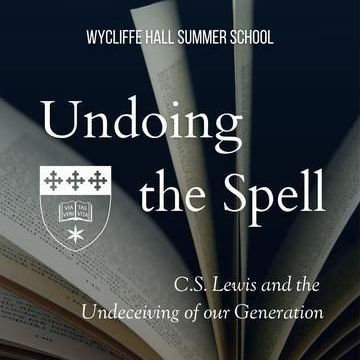Making a Beginning (or the "Both-And" of Worship): A Sermon on Ezra 3:8-13
This term, in the Wycliffe Hall Communion services, we are preaching our way through Ezra. After a rather brilliant sermon on the VERY length lists and genealogies in Ezra 1-2 and a thoughtful reflection on the festival of booths celebrated in Ezra 3:1-7, I was up to preach on the second half of that chapter, vv.8-13. The full text of the sermon is below the video.
***
Making a Beginning
In 2017 my husband and I bought our first home together. It’s actually the home that we sold just a few weeks ago. But back when we bought it, we could see that despite the scratched and worn floorboards, the peeling paint, the old and dated kitchen—all those years where it had been a rental house—there was yet a huge amount of potential lying beneath the surface. And so fairly early on after we’d bought it, I took on the rather ridiculous task of removing 70 years’ worth of paint from all of the windows, the doors and the door frames. If I knew then what I know now about how much work was going to be involved, I might have passed, but I didn’t. We pressed ahead to restore the house to its original glory.
Over the course of two and a half years I spent weekend after weekend playing with different types of paint stripper and I got to discover the various tools that assist in removing the multiple layers of paint that had accrued over the decades. Eventually the paint was gone, but some residue remained: it was by no means finished. We needed somebody to come in and to sand everything down and finish the job. And I realized the task ahead far exceeded my skill set. So we paid a team to do the work.
I still remember when they called me in to look at the first window that had been finished. Seeing the wood grain come alive in these old pine window frames in our living room took my breath away. It was amazing to see the beauty of the house restored. Yes, it was just the beginning, but with the beginning I could see the start of what was to come.
***
In our reading from Ezra 3 today, the Israelites are in the process of making a beginning that will restore a past glory. They’ve been back in the land a couple of years, they’ve begun to worship and offer sacrifices and burnt offerings. They’re celebrating their festivals. But now they’re getting to work on building the temple itself, which begins with them laying a foundation. It’s not quite clear what the text is referring to here, it could be just that they broke ground or it could be they were starting to lay down some materials. But regardless of what was it was, we know some form of beginning is taking place. The cedar wood has been imported. The Levites are overseeing the job. And they’re beginning to get a glimpse of a past glory.
But this is not just the glory of restoring a craftsman house in Texas, or a piece of antique furniture, a classic car or anything else. This is about building a new temple fit to house the glory of God himself.
***
Awaiting the Glory of God
In v.11 we read that the people praised God saying: For He is good, for his steadfast love endures forever towards Israel. (v.11)
These words are said as the people celebrate what they are witnessing. And the priests are vested. They and the Levites have musical instruments in hand. They’re singing with call and response (probably with a little more than gusto when we pray the psalms antiphonally in chapel!).
For He is good, for his steadfast love endures for ever.
What’s interesting is that it’s these same words are used at the dedication of another temple. Solomon’s temple. In Chronicles, these are words are associated with the glory of God being seen: presence being manifest in the midst of the people.
We see it in 2 Chronicles 5, just as the temple is finished. The priests and the Levites have raised a shout. Instruments are being played. They’re praising God, declaring this refrain “For he is good, for his steadfast love endures forever.” And then, the temple was filled with a cloud. The glory of the Lord appeared among them. And it was so over-whelming, the priests could not even find their feet.
A similar thing happens again two chapters later, after Solomon’s prayer of dedication. Solomon finishes up praying, and then fire comes, rushing down from heaven, consuming the burnt-offering and sacrifices laid at the altar. On sight of this divine deluge of fire from heaven, the people of Israel fall prostrate, face-down on the ground. And they give thanks to God declaring “For he is good, for his steadfast love endures forever.”
Here in Ezra 3, this time with the second temple, there is music, there is singing and celebration that they were restoring the temple, not for its own glory, but in order to house the glory of God. Yet they are not there yet. They’ve seen something of God’s faithfulness in bringing them this far, but they are just making a beginning.
***
The Both-And of Worship
Our passage today is just 6 verses long. It is not a long text. The book quickly moves on: the next chapter takes us into the challenges the people face in building the temple. But what I find so significant is that within this beginning the people are making, there is space in their worship for quite different responses.
Yes, there’s the rejoicing and rowdy celebration taking place.
But there are also people who are don’t feel so upbeat. People who are weeping. People who are feeling some pretty deep grief and loss. These are the folk that were old enough to have seen the first temple—who remembered what life was like before the exile and Babylonian captivity.
Why were they grieving?
- Maybe it was disappointment that somehow they already knew the second temple would never be as grand as the first one
- Perhaps it was the finality that despite the new and good things taking place, it meant the old things—the former good, the former glory—truly was over.
- Maybe it was a culmination of their sorrows. The tragedy upon tragedy they’d experienced from the time of Solomon’s temple, seeing it destroyed and being taken into captivity in a foreign land.
We don’t know exactly.
But what we do know, and what I think is pretty remarkable about this passage is that gives us a glimpse of worship taking place that can be “both—and”. It can celebrate all that is good and mourn the losses. It doesn’t shy away either from successes and God’s provision nor from deep scars and aches and pain carried by God’s people.
“Both—and.”
I think there is a challenging lesson for us to sit with in this text, because sometimes worship can seem to presuppose what we should feel. Sometimes, those of us who put together a service can choose songs or readings or prayers that skew the reality of life and make it feel a bit like it’s “either-or.”
***
I remember when I was in my mid-twenties and a dear friend of mine died of cancer, just past his 30th birthday. It was a particular painful season for me, not just because of the loss of my friend, but also that he was the third of three people I knew and loved who had died far, far too soon.
I share this because it made participating in the worship in church quite difficult. Because unlike here in Ezra 3, or the breadth of the Psalms which capture the breadth of human experience, there was little space for sadness. The songs were pretty relentlessly upbeat, they all focused on the good of the gospel. But there was little space for bringing into worship our experience of the messy and broken world that God in Christ is redeeming.
I wonder if we as Christians can sometimes be in too much of a rush to the end of the story. Like skipping ahead and reading the last chapter of the book, we miss the how it all comes about. We forget that resurrection and life is only possible through death. We forget that what it is to live and die in a messy and broken world was fully faced and experienced by God’s own Son.
***
In these 6 verses, Ezra 3 gives us a picture of worship in which there is joy and sadness without differentiation. Literally! The noise was such a jumble, it was impossible to tell them apart.
Perhaps they knew that neither joy nor sorrow can truly exist without the other. That joy only finds its feet when we’ve faced our griefs. That the promise of joy is what emboldens to press onwards, even when grief and pain are real.
God’s people were making a beginning in building a new temple that might one day house the glory of God. And their celebration and worship was able to house where that brought about joy and sorrow.
***
The End of the Story
The book of Ezra and Nehemiah actually form one, longer book. And towards the end of Nehemiah, in chapter 12, we find the end of the story. The temple is finished and the city wall has been built and dedicated. The people again sang and rejoice loudly. Like in Ezra 3:13 where the cacophony of feeling was heard from distance, Nehemiah 12:43 concludes by saying “The joy of Jerusalem was heard far away.”
But what is different is that here, at the end of the book, the only sound heard was joy. There was no longer any mourning. For whatever reason, it was all rejoicing. No tears.
As Christians we know the end of our story will be likewise. The vision of Revelation 21 is of a new heaven and a new earth. A new Jerusalem in which God will dwell with his people. And he will wipe away every tear from their eyes. No more grief or sorrow or pain. All joy. But we are not there yet—so let’s not be in a rush to get ahead of ourselves as if the kingdom of God all depended on us and is not the work of God himself.
Life in the now and the not yet, is always in the process of making a beginning. We are among those who are the first fruits of what is to come. We are among those waiting for the fulness of God’s glory to arrive. The whole of creation is longing for that day. So in our worship, as in the rest of our lives, may we embrace the honesty of human experience found here in Ezra 3. The both-and:
Let us be unafraid to rejoice in what we know of God. What we have seen of his restoration already. When lives are restored. The lost found. The sick healed. The sinner forgiven.
But let us be equally unafraid to give voice—and space—to our grief. Where good things of the past that have been lost in the ravages of human violence and tragedy. Where we’ve experienced the damage and destruction of sin—ours or others. Where we have come face-to-face with the fallout of the messy and broken world in which we live.
We can both, confident that one day all will be well.
Why?
For He is good, for his steadfast love endures forever.
******
Photo by Scott Blake on Unsplash
Subscribe to
My Newsletter
Sign up here to receive quarterly updates (and occasional other news blasts) about how ministry is going and our move to the U.K.



